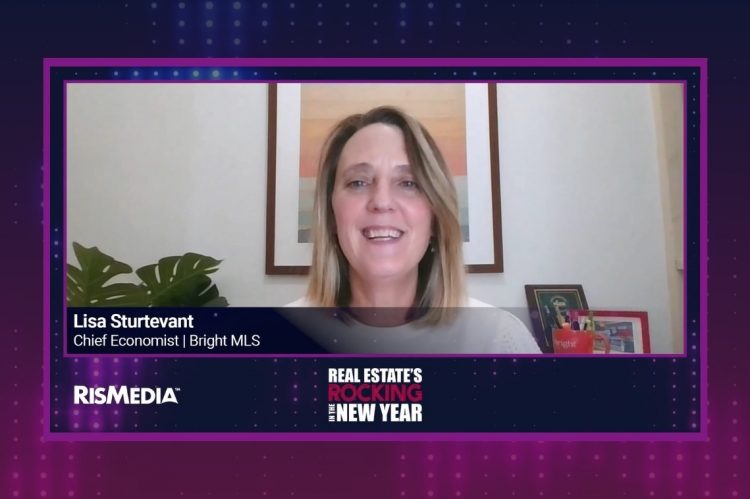When it comes to the housing market, in 2025, the only thing we should expect is the unexpected.
At least that’s what Dr. Lisa Sturtevant, chief economist at Bright MLS, had to say about the state of the housing market during RISMedia’s Real Estate’s Rocking in the New Year virtual event last week.
With today’s political and economic uncertainty, forecasting the housing market “beyond the near term really could be considered a fool’s errand,” she said. ” “None of the old rules apply anymore, so while forecasters try and look back and try and predict the future based on what happened in the past, those past relationships don’t always hold true in the current environment. So for me, that means we should expect the unexpected in the 2025 housing market.”
Looking at data, trends and key changes from the past year, Sturtevant shared her predictions on this year’s market, which may play out differently than “what conventional wisdom might suggest,” along with an economic overview of where we stand now.
Mortgage rates
This year’s market expects mortgage rates to remain higher for longer.
“A strong economy coupled with some proposed federal government policies suggest inflation may be stalled, and there’s going to be a pullback in the number of rate cuts by the Federal Reserve,” said Sturtevant.
Most forecasters do expect mortgage rates to come down in 2025, she added.
“We’re not looking at sub-6% anytime soon, but it may be that we don’t need rates to come down that much for buyers and sellers to be enticed back into the market.”
In “normal times,” buyers and sellers tend to hold back when rates and home prices are high. But in 2025, buyers and sellers have “reanchored their expectations, and rates may not have to come down as much as we think they do in order to bring buyers and sellers back into the market.”
In the fourth quarter of 2024 and into 2025, rates have been volatile—reacting to expectations rather than actions, added Sturtevant.
After December’s Fed rate cut and the release of its updated economic projections showing potentially two rate cuts instead of the expected four, mortgage rates increased.
Who is selling?
While many expect boomers to be the largest group of sellers, Sturtevant predicts that pandemic-era homebuyers will lead listing activity in 2025.
Homeowners in their 30s and 40s are most likely to sell their homes in the next year, according to a study by Bright MLS.
Nearly a third of homeowners planning to sell this year have lived in their homes for less than five years, said Sturtevant.
Who’s looking to buy, and what are they looking for?
Remote work, though not going away, gave buyers more flexibility, but buyers in 2025 are thinking more about returning to the office and prioritizing commute time.
“So if you bought a home during the pandemic, out in the country or just even in the distant suburbs, and now your employer is calling you back to work five days a week, that commute is really going to be untenable,” said Sturtevant.
About 26% of homeowners who work remotely said they would “probably or definitely have to move” if they were to return to office. Another 25% said they wouldn’t move, but they would have a “pretty long commute.”
When looking at neighborhoods, the majority of buyers are prioritizing their potential commute time over the proximity to friends and family, the walkability score and schools, said Sturtevant. That is a shift from recent trends, with National Association of REALTORS® (NAR) surveys usually finding that both buyers and sellers were driven by family factors when moving over the last few years.
The return-to-office shift is also shown in the de-prioritization of home offices, according to Sturtevant—a feature that used to be front of mind during the pandemic.
Affordability
Due to the “major constraint” that affordability has placed on the housing market, along with it reaching an all-time low in 2024, the expectation is that buyers will look at more affordable markets to “try to stretch their dollar.”
Instead, Sturtevant predicts that we will see higher-cost markets outperforming more modestly-priced markets.
Higher-income households are going to be in a better financial position in 2025 than more moderate-income households, leading to higher prices in those high-cost markets.
Further, with the shift to return-to-office, larger, higher-cost metro areas will be in more demand than they were over the last few years.
Bright MLS forecasts the year-over-year median home price to increase by 3.1% in 2025, which falls in line with most forecasts that expect prices to go up somewhere between 2% – 4% this year.
“So 2025 is shaping up to be a year of continued uncertainty. Underlying economic and demographic fundamentals are still going to drive housing market conditions,” said Sturtevant.
“But now more than ever, we need to be paying attention to the lingering effects of the pandemic as well as changes in homebuyer and seller preferences and frankly how all of this uncertainty affects consumer confidence and consumer behavior in the year ahead.”












